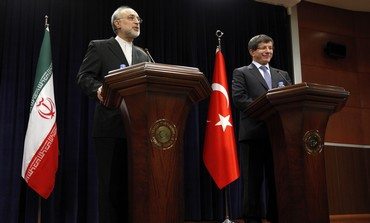Anuclear Iran will be tantamount to the collapse of the over five centuryold balance of power between Turkey and Iran which was first created by the Battle of Chaldiran between the Ottoman and Safavid empires in 1514.
Only after Selim the 1st (or Yavuz Sultan Selim Khan – the first Sultan of the empire who claimed the caliphate) overcame the Safavid Empire of Persia was Istanbul able to exert full control and authority over eastern Anatolia and Northern Iraq. However, for some time now Ankara’s sovereignty in eastern Anatolia and vital national security interests in Northern Iraq have been under significant Iranian threat via proxy war, subversive activities, and political and military machinations. Iran also stands in the way of Turkey’s regional hegemonic agenda, especially in Syria, and in a greater sense in the Levant region.
Throughout history, this corridor has always been a natural route for Turkish expansions into the region we call Greater Middle East today. As a matter of fact, just a couple of years after Sultan Selim Khan vanquished the Safavid Empire in Chaldiran he fought another regional power, the Mamluk Sultanate, at the Battle of Merj Dabik, and conquered Syria, Lebanon and Palestine, or in other words a large portion of the Levant.
At this juncture, understanding the geopolitical mentality of the Ottoman expansion and its correlation with Iran is of crucial importance. In order to project power in the Levant, Turkey has to be safe from the Iranian threat. And vice versa: Iran, whether the Safavids or the contemporary Islamic Republic, must keep Turkey under constant threat to secure the Levant and/or avert Turkish expansion. Thus, Turkish decision-makers should well understand the geopolitical logic of Selim Khan’s perception of Iran as the rock separating between Turkey being caged into Anatolia or being a real regional power (which is definitely not same thing as being popular in the region).
Iran’s desire to keep Turkey constantly under threat resurfaced in the 1990s and 2000s via Tehran’s proxy war attempts. Be it the Kurdish Hezbollah or PKK terrorism, Tehran will do its utmost to keep Ankara in trouble with constant low-intensity conflicts.
Put simply, if the whole Turkish 2nd Army, which is responsible for the Iraqi, Syrian and Iranian borders, was not dealing with the terrorism threat, it would probably be occupied with power projection activities beyond its field of responsibility.
Iranian strategists are aware of this fact. Turkey overcame Damascus when it was harboring PKK in the 1990s through an escalation strategy and gunboat diplomacy.
Can those measures be taken against a nuclear Iran? This is just a hypothetical question for now, however, in the near future it could be a very real scenario facing the Turkish security establishment.
TO COUNTERBALANCE a nuclear threat from Iran, Turkish leaders will have only two options. The first is to pursue mass conventional military modernization and procurement, and an aggressive shift in military doctrine. This means an additional burden on Turkish taxpayers and a great cost in terms of investments in social improvement and economic development.
The second option is to pursue its own military nuclear program. Technically, however, this would be almost impossible to accomplish due to Turkey’s ties with the Western security system and commitment to the NPT regime.
The only other thing Turkey could do is depend on NATO guarantees (Article 5), or the US nuclear umbrella.
However, initiation of Article 5 necessitates a unanimous decision of all member countries.
In other words, it would be tantamount to pledging Turkey’s national security, at the existential level, to a consensus in which even Estonian or Lithuanian refusal could prevent a joint move.
When it comes to the American nuclear umbrella, the situation might be complicated.
After the Cold War, there is no US tactical nuclear capability left on Turkish soil. It is known that there are nuclear warheads at the Incirlik base, but Turkey does not hold the trigger mechanism.
Briefly, a nuclear Iran cannot be, or only at a very steep cost, deterred by Ankara. This reality probably spells the end for Turkey’s historical imperial character. Besides, a completely secure Islamic regime cannot tolerate both Turkey’s secular constitution and the AK Party’s democratic conservatism, which is at peace with liberalism and an open economy.
Moreover, within the sectarian fragmentation of the region, a nuclear Iran will most likely spearhead the Shi’ite bloc against Turkey more aggressively.
Thus, Ankara either gets tough with Iran now, or lets a nuclear Iran go tough with Turkey in the near future.
IN SUMMARY, Turkish decision makers should simulate the first day of Iran’s nuclear breakthrough, and count down to the present day. Then they can clearly see that every single day counts, and that Tehran’s nuclear breakthrough has to be prevented at all costs.
Turkish mass media keeps voicing the opinion that the military option would be a nightmare for the region, and defends muddle-through efforts that can do nothing but buy time for Iranian President Mahmoud Ahmadinejad.
They are correct in saying that the military option would be a nightmare – but on the other hand, it would also be a nightmare to allow a tyranny which is also Turkey’s historical geopolitical rival in the region to arm itself with nuclear weapons.
We will soon see whether anyone in Turkey today clearly perceives the Iranian threat as did Sultan Selim Khan, or whether “sober and wise” intellectuals, seeing the mushroom cloud over Istanbul, keep repeating that “the military option against Iran would be a nightmare for the region” – probably from the safety of an NBC shelter.
The author, who served as a post-doctoral fellow for the Begin-Sadat Center for Strategic Studies at Bar-Ilan University, holds a PhD from the Turkish War College, and a Master’s degree from the Turkish Military Academy.




